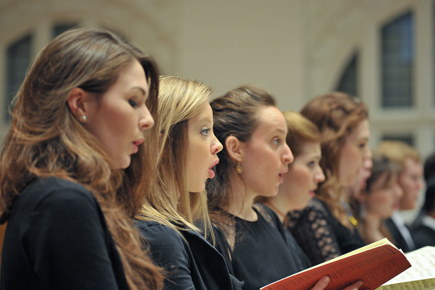RCM Research Shows Singing Benefits Cancer Patients
Monday 4 April 2016
Researchers have found that singing in a choir for just one hour boosts levels of immune proteins in people affected by cancer, reduces stress and improves mood, which in turn could have a positive impact on overall health. The new study by Tenovus Cancer Care and the Royal College of Music has been published today in ecancermedicalscience.
The findings raise the possibility that singing in choir rehearsals could help to put people in the best possible position to receive treatment and maintain remission.
‘Many people affected by cancer can experience psychological difficulties such as stress, anxiety and depression’ said Dr Daisy Fancourt, co-author of the research and Research Associate at the , a partnership between the RCM and Imperial College London. ‘Research has demonstrated that these can suppress immune activity at a time when patients need as much support as they can get from their immune system. An activity as simple as singing could reduce some of this stress-induced suppression, helping to improve wellbeing and quality of life amongst patients.’
In addition, the research, which studied 193 members of five different choirs, found that participants with the lowest levels of mental wellbeing and highest levels of depression experienced greatest mood improvement, associated with lower levels of inflammation in the body.

Participant Diane Raybould reported that ‘[choral] singing is about more than just enjoyment, it genuinely makes you feel better. Having cancer and losing someone to cancer can be very isolating. With the choir, you can share experiences openly and that is hugely important.’
Dr Ian Lewis, Director of Research and Policy at Tenovus Cancer Care and co-author of the research, said ‘these are really exciting findings. We’ve long heard anecdotal evidence that singing in a choir makes people feel good, but this is the first time it’s been demonstrated that the immune system can be affected by singing.’
Tenovus Cancer Care is now launching a two year study looking in more depth at the longitudinal effect of choir singing over several months. It will look at mental health, wellbeing, social support and ability to cope with cancer, alongside measuring stress hormones and immune function amongst patients, carers, staff and people who have lost somebody to cancer.
For further information please see the project webpage or our press release.








